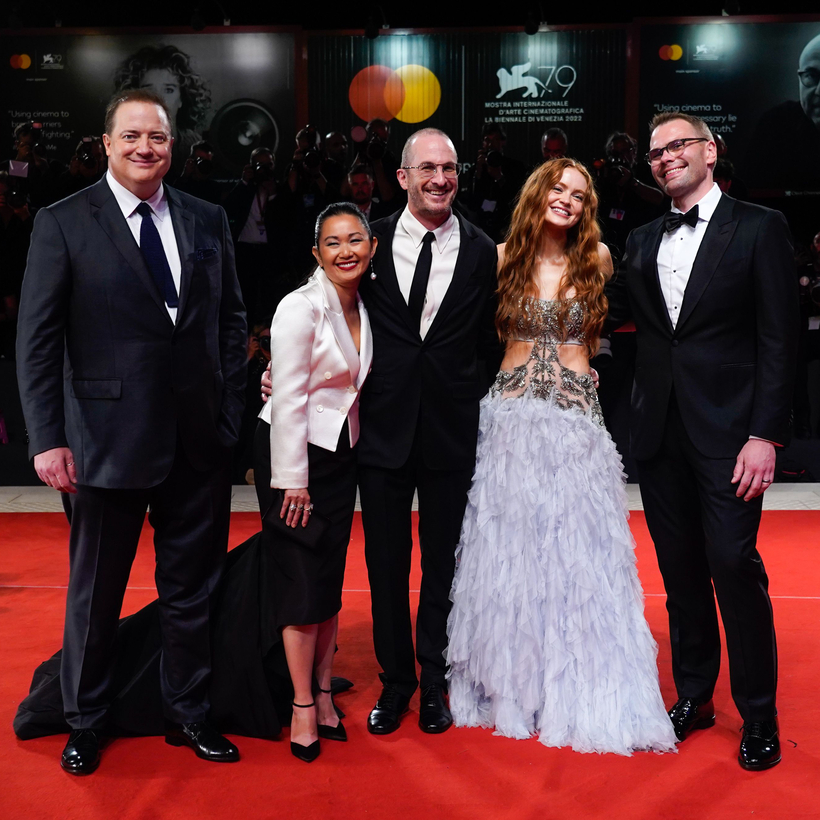About 30 minutes into my interview with the MacArthur-winning playwright Samuel D. Hunter, he brings up Hegel’s definition of tragedy. The philosopher thought that tragedy sprang not from a struggle between right and wrong but between two noble forces that can’t coexist. “It’s not about a bad guy winning and a good guy losing; it’s a tragedy of the math not working.” We were speaking a few weeks after Darren Aronofsky’s film adaptation of his play The Whale had hit theaters, and as Hunter was workshopping a revival of A Bright New Boise, which begins previews at New York’s Signature Theatre next week.
Hunter, 42, wrote The Whale and A Bright New Boise back-to-back more than 10 years ago and has described them as “companion pieces.” He sees the plays as not just thematically linked—they both deal with parents estranged from and trying to reconnect with their kids—but as artistically connected. “It’s helpful to me as a writer to think as if I’m writing a bunch of chapters in the same book or a bunch of short stories in the same collection,” he said.

If each place has its bard, Sam Hunter is Idaho’s. His family has lived in the Gem State since 1867, and one of his great-great-grandfathers, who fought in the Civil War for Ohio, became the first postmaster in Moscow, Idaho. (Hunter, who is based in New York, goes back to visit as much as he can, though having a child—he and his husband, the dramaturge John Baker, adopted a daughter five years ago—has cut down on his traveling.) Despite being anchored in Idaho, the physical settings of his plays are richly varied—a retirement home, a Costco, an Italian restaurant, the office of a mortgage broker, a gay-conversion camp in the wilderness, and a town whose citizens have voted to unincorporate, to name only a few.
A Bright New Boise, which won an Obie Award in 2011, is classic Hunter. A black comedy flecked with bits of the supernatural, the play revolves around Will, a working-class drifter who applies to work at a Hobby Lobby store in the hopes of getting to know another employee there: his biological son, whom he gave up for adoption as a baby.
Hunter often sets his plays in places that he has a “natural relationship” to, and the break room of the Hobby Lobby where Will works doubles as an occasional home for two of the characters. When I ask about the porousness between work and home in his plays, Hunter tells me it’s of a piece with his interest in exploring the lives of precarious or working-class people. Places like the break room of a Walmart—where Hunter worked when he was 17—are “at once public and private. Part of the nature of their work is that the employees there are a little bit dehumanized on a daily basis from doing the same thing over and over. And so when they go into this break room, they’re really craving humanity.”

Religion—specifically the ways that faith can ossify a person’s outlook or serve as equipment for living—is another theme that runs like a red thread through several of Hunter’s plays. In its own way, A Bright New Boise makes an eloquent “case for the existence of God,” to burglarize the title of one of Hunter’s more secular plays, produced last season at Signature Theatre.
To some extent, Hunter is drawing from personal experience when he invokes religion in his plays. “As a young person ensconced in a religious community, the religion itself was like this big, warm sweater that just enveloped me.” Yet around the 10th grade, Hunter realized he was gay and started questioning much of what he was taught. For some people, he says, “theology is a brick wall that they hide behind.”
A Bright New Boise sizzles with the tension of characters simultaneously craving the “comfort and security of being behind the wall” and knowing that to retreat behind the wall is to annihilate a part of themselves. That tension may not be fully resolved by the end of the play, but it makes Will’s predicament no less worthy of exploration.
Previews for Samuel D. Hunter’s A Bright New Boise will begin at New York’s Signature Theatre on January 31
Rhoda Feng is a New York-based writer whose work has appeared in The Village Voice, The Observer, the New Republic, and elsewhere

